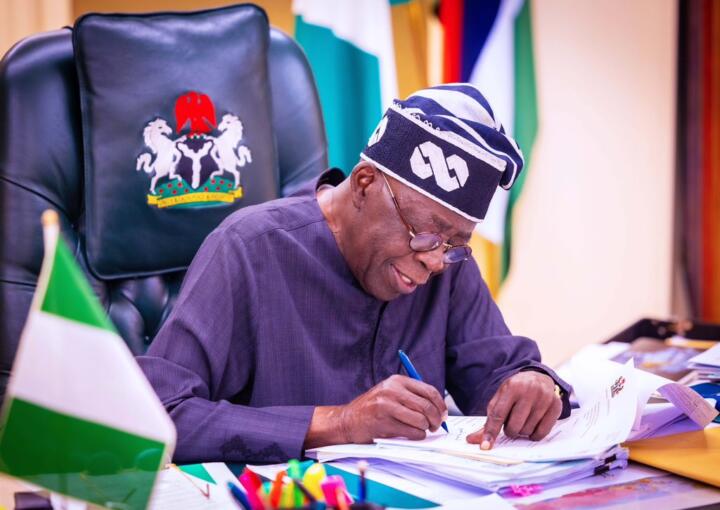The Federal Executive Council (FEC) took a momentous step on Monday by giving its full endorsement to the establishment of a substantial $5 billion annual trust fund dedicated exclusively to humanitarian and poverty alleviation initiatives. This significant decision was announced during the weekly FEC meeting, which was presided over by President Bola Tinubu at the State House.
The approval, communicated by President Tinubu to the cabinet members in attendance, signifies a resolute commitment to addressing critical social and economic issues in Nigeria. The move was received with optimism and enthusiasm, as it represents a substantial investment in the betterment of the lives of the nation’s most vulnerable citizens.
Betta Edu, the distinguished Minister of Humanitarian Affairs, shared further insights with State House correspondents after the FEC meeting, shedding light on the intricacies and goals of this monumental fund. She revealed that the fund’s primary objective is to accumulate a substantial annual sum of $5 billion. This ambitious financial target underscores the government’s dedication to effectively tackle humanitarian crises and combat poverty in Nigeria.


To ensure the efficient management and allocation of these funds, Minister Edu conveyed that a governing board would be established. This board will be responsible for overseeing the execution of the fund’s various initiatives and projects. Notably, the governing board will consist of key figures, including the Minister of Finance, alongside other relevant ministers who are integral to the fund’s objectives.
In her statement, Minister Edu emphasized that this financing model is designed to be flexible, allowing Nigeria to respond adequately to humanitarian crises and challenges while simultaneously addressing the pressing issue of poverty in the country. She noted that this initiative is a resounding victory for the marginalized and impoverished segments of the population, aligning seamlessly with the principles of the Renewed Hope Agenda.
Edu expressed the importance of this trust fund in bringing much-needed assistance and relief to those who need it most, echoing the vision of President Bola Ahmed Tinubu’s administration. It is a clear signal that the government is committed to ushering in a brighter and more equitable future for all Nigerians, especially those grappling with the hardships of poverty.
Beyond the approval of the trust fund, the Federal Executive Council also ratified the protocol designed to secure the rights of the elderly in Nigeria. Minister Edu confirmed this development, noting that Nigeria had officially endorsed the African charter, thereby solidifying its commitment to protecting the rights of older citizens and preventing discrimination against them at any level.
This move holds profound significance, as it reflects the government’s dedication to the welfare and rights of the elderly. By aligning with the African charter, Nigeria joins other countries on the continent in acknowledging the importance of safeguarding the rights of older individuals and affording them the protection and respect they deserve.
The journey toward establishing this groundbreaking $5 billion annual trust fund has been in motion for some time. Minister Edu first unveiled plans for the fund during her address at the 78th United Nations General Assembly (UNGA) in New York, United States, which took place in September. During her UNGA speech, she outlined the funding structure, revealing that 30% of the financing would be sourced from the federal government, with the remaining 70% anticipated to come from donor agencies.
This approach not only underlines the government’s commitment to addressing poverty and humanitarian crises but also emphasizes the importance of partnerships and collaboration with international organizations and donors. By securing a substantial portion of the fund through external sources, the government is signaling its dedication to tackling these challenges on a global scale, leveraging international support to amplify its impact.
Crucially, the fund’s structure also places a strong emphasis on governance and accountability. Minister Edu highlighted that a structured governance system will be put in place to oversee the fund’s management and ensure that the allocated resources are utilized effectively and transparently. This commitment to accountability reflects the government’s intention to use these funds efficiently and make a tangible difference in the lives of those it aims to assist.
In conclusion, the FEC’s endorsement of the $5 billion annual trust fund represents a significant step forward in the Nigerian government’s efforts to address humanitarian crises and combat poverty. The fund’s establishment, coupled with the commitment to protecting the rights of the elderly, underscores the administration’s dedication to social welfare and equality. As this initiative takes shape and funding is secured, it holds the potential to bring about meaningful and lasting change in the lives of the nation’s most vulnerable citizens, aligning with the principles of the Renewed Hope Agenda and Nigeria’s commitment to international cooperation and accountability.
Support InfoStride News' Credible Journalism: Only credible journalism can guarantee a fair, accountable and transparent society, including democracy and government. It involves a lot of efforts and money. We need your support. Click here to Donate
